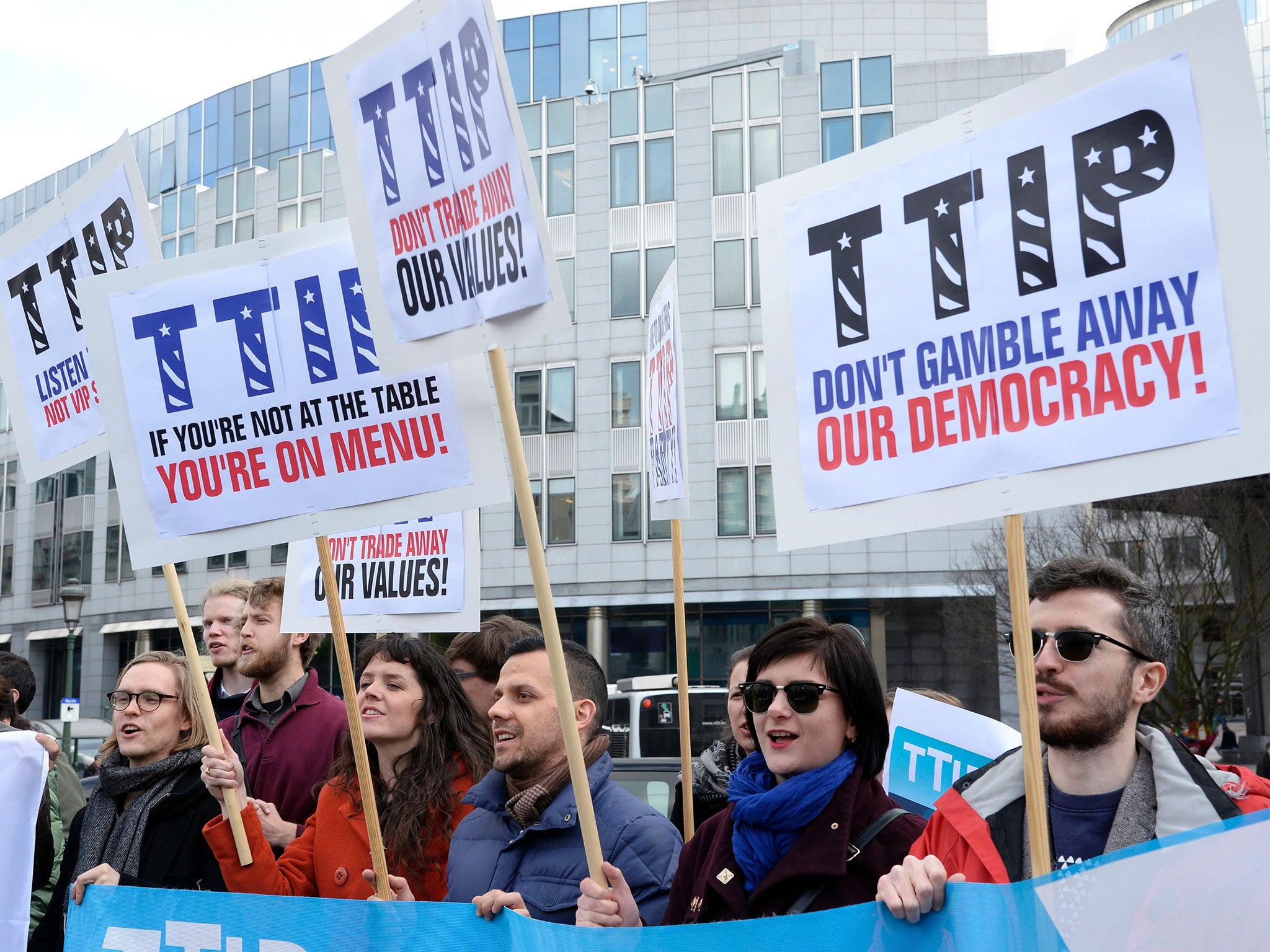'TTIP on steroids': Campaigners warn post-Brexit UK faces 'disastrous' trade deal with US
Britain could end up with 'the most extreme and toxic version of TTIP', activist says

Your support helps us to tell the story
From reproductive rights to climate change to Big Tech, The Independent is on the ground when the story is developing. Whether it's investigating the financials of Elon Musk's pro-Trump PAC or producing our latest documentary, 'The A Word', which shines a light on the American women fighting for reproductive rights, we know how important it is to parse out the facts from the messaging.
At such a critical moment in US history, we need reporters on the ground. Your donation allows us to keep sending journalists to speak to both sides of the story.
The Independent is trusted by Americans across the entire political spectrum. And unlike many other quality news outlets, we choose not to lock Americans out of our reporting and analysis with paywalls. We believe quality journalism should be available to everyone, paid for by those who can afford it.
Your support makes all the difference.Campaigners against the controversial TTIP trade deal with the US fear the UK will negotiate an “even more disastrous” agreement after it leaves the European Union.
TTIP has provoked opposition across Europe with concerns it will open up public sector organisations – such as the NHS – to privatisation, force food safety and environmental regulations to be watered down or scraped, and cause unemployment as jobs move to the US where labour standards and trade union rights are lower.
European politicians, including French President François Hollande and Germany’s agriculture minister, Christian Schmidt, have signalled their opposition to the US’s current proposals with Mr Hollande saying France was opposed to “unregulated free trade”.
But given the smaller size of the UK market, it would have less negotiating power in talks with the US than the EU.
And Nick Dearden, director of Global Justice Now, said the “right-wing lurch of Brexit” could result in Britain signing up to “TTIP on steroids”.
“Alongside US lobbyists, the British government has done everything possible to push the most extreme and toxic version of TTIP,” he said.
“So there’s every reason to suspect that the UK will look to develop a bilateral deal with the USA that could end up being even more disastrous for labour protections, consumer standards and public services than TTIP was going to be.”
He said TTIP was “on the verge of defeat” because of the level of opposition across Europe.
“Working alongside civil society, social movements and progressive MEPs from across Europe, we were in a really strong position to derail TTIP,” Mr Dearden said.
“Brexit means that we need to redouble our efforts to stop the UK’s free market fundamentalists from enabling massive corporate power grabs through bilateral trade deals.
“Progressives on both sides of debate need to work towards a trade framework built on equality, fairness for workers and the redistribution of wealth towards those communities who have rebelled so vehemently against the political establishment this morning.”
It is unclear if TTIP will apply to countries that are not in the EU but which are members of the common market, such as Norway. The Norwegian model has been suggested as a possible option for a post-Brexit Britain.
John Hilary, executive director of War on Want, said anti-TTIP activists would now have to refocus their campaign.
“The UK is going to have to renegotiate all of its trade deals. It’s up to us as activists to press for the positive trade agenda we never got in the EU,” he said.
But Mr Hilary sounded a positive note, saying the UK government was democratically accountable to the people where the European Commission was not.
“For us, the situation is now a different one. The powers are going to be brought back to Britain,” he said.
“The future is ours to claim. It’s an uphill struggle because we know that in this country traditionally we have had the most neoliberal governments in Europe, whether they be Tory or New Labour.”
He said the future was unclear as the UK would now have to negotiate a new relationship with the EU.
But he insisted: “Brexit means TTIP will not apply to the UK, that’s absolutely clear.”
Join our commenting forum
Join thought-provoking conversations, follow other Independent readers and see their replies
Comments